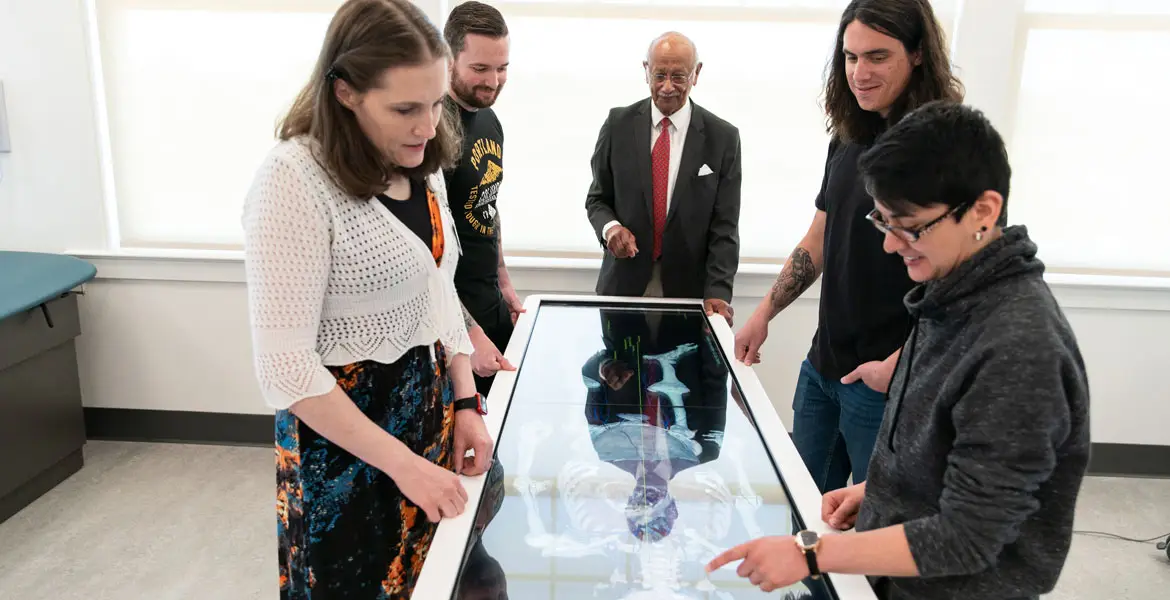
How to Get into Physical Therapy School
by Megan Bos, Admissions Counselor for the Doctor of Physical Therapy Program
People who suffer traumatic injuries often face significant challenges, such as a lack of mobility or chronic pain. Physical therapists can provide critical assistance to these patients by offering hands-on therapies and prescribing targeted exercise regimens along the road to recovery.
If you’re interested in becoming a physical therapist, you’ll need a Doctor of Physical Therapy (DPT) degree. You’ll also need to pass the National Physical Therapy Examination (NPTE) and obtain a license to practice in the state where you want to work.
Here are some things to think about as you explore this exciting career path and consider pursuing a DPT degree.
How hard is it to get into physical therapy school?
Getting into physical therapy school can be challenging because DPT programs are fairly competitive, so students are encouraged to apply to more than one program at a time. Even though the admissions process is competitive, being accepted is possible with some hard work in the classroom, good preparation and a commitment to submitting a strong application.
If you’re not offered admission the first time you apply, you can apply again in future years. Just be sure to improve the weaker parts of your application, such as retaking courses to try to earn a higher grade. Submitting the exact same content is never a good idea.
Physical Therapy School Requirements
Different DPT programs have different admission requirements, so it’s important to check with the programs you’re interested in to make sure you complete the required credit hours for each prerequisite category.
In general, you’ll need to take courses in anatomy and physiology, chemistry, physics, statistics, biology, and psychology. If it’s been more than seven years between the date you completed a course and the date you’re applying, you’ll likely be required to take it again.
Criminal background checks are an important part of clinical education requirements for PT students. Most clinical rotation sites will require students to complete a background check. Failure to do so or having certain results in a background check may bar you from participating in clinical rotations, which are a required part of PT school. If you have specific questions or concerns about your background check, please reach out to the programs you're interested in.
View admission requirements & prerequisites for George Fox’s DPT program in Oregon
Observation Hours
Many PT schools require applicants to complete a certain number of observation hours before applying to the program. These hours can be obtained through unpaid shadowing experiences or paid work experiences, such as being a physical therapy assistant (PTA) or physical therapy aide. In order to be considered, observation hours should come from experience with a licensed physical therapist. At George Fox, we consider 100 total observation hours to be competitive when applying to our DPT program.
Ideally, these hours should be divided between outpatient and inpatient settings. Inpatient settings refer to patients staying overnight in the facility where they are receiving care, such as hospitals, some acute care facilities, skilled nursing facilities, and home health. Outpatient settings refer to those where patients do not stay overnight, such as orthopedic, post-acute, and sports clinics.
Applicants are also encouraged to gain experience in any specialty settings they may be interested in, such as neurorehabilitation, cardio/pulmonary, pediatrics, men's/women's health, oncology, school PT, and others. While not required, applicants may find these speciality settings helpful in determining their areas of interest for clinical rotations during PT school and after graduation.
Learn more about observation hours for George Fox’s DPT program in Oregon
What major do I need for physical therapy?
There’s no required area of study for your bachelor’s degree to get into a doctor of physical therapy program, but fields related to healthcare are good preparation. The core requirements of these undergraduate programs typically align with most (if not all) of the DPT prerequisites. Some good examples of degrees to consider are pre-physical therapy, kinesiology, exercise science, athletic training and biology.
What’s the average college GPA of students who get into DPT programs?
For George Fox University’s entering DPT class of 2023, the average overall GPA was 3.57, and the average prerequisite GPA was 3.53.
Do I have to take the GRE to get into a DPT program?
This can vary by program. Some doctor of physical therapy programs put an emphasis on GRE (Graduate Record Examination) scores and have minimum acceptable GRE scores, while others don’t consider it in their application review. It’s important to check with the program(s) you’re applying to so you can make sure you’re fully prepared. At George Fox, we do not require the GRE, nor do we consider it during the application review process.
How do I apply to a DPT program?
Many doctor of physical therapy programs use the PTCAS (Physical Therapist Centralized Application Service) application system offered by the American Physical Therapy Association (APTA) to accept applications. PTCAS allows you to submit one application to multiple programs at the same time. When you’re completing the application, some questions are the same for all programs, and all of the programs you selected will see your answers to those questions. In addition, each program has its own custom questions that you’ll need to answer.
All DPT programs that use PTCAS open their applications on the same day each year: June 15. However, each program chooses its own application deadline, and some also include an early deadline, which usually allows your application to be reviewed sooner. At George Fox University, applications for our doctor of physical therapy program are due by November 1. It's important for you to keep track of each program’s timeline so that you don’t miss out on important dates and deadlines.
Each school evaluates applications differently. At George Fox, DPT applications are reviewed by an admissions committee that selects candidates for an interview. We host our interviews in January and notify applicants of decisions shortly thereafter. Not all programs require interviews for their admission process, but we find that in-person interviews are an effective way for us to get to know applicants and for applicants to get a feel for what it could be like to be a DPT student at George Fox.
What if I’m a PTA – does that change anything?
If you’re a physical therapy assistant (PTA), some programs may give preference to you based on your experience, while others may not. Regardless of this, being a PTA provides great experience in the field while helping you gain observation hours, which many physical therapy schools include as part of their admission requirements.
What can I do to make my application stand out?
George Fox’s DPT program looks at applications holistically, meaning every part of an application is important to us – academics, observation hours, references, essays, etc.
That being said, standout applicants typically have these qualities:
- A high GPA that demonstrates the ability to do well in upper-level science classes. Competitive candidates to George Fox's DPT program have a prerequisite grade point average of 3.25 or above.
- References who know them well and can speak to their strengths as students and future clinicians. George Fox requires one academic reference from a professor in your major or one of your prerequisite courses and one reference from a licensed physical therapist who can say they've known you in a professional capacity for at least three months.
- Observation hours in a variety of different settings to give them a broad, foundational knowledge of the field. These experiences are invaluable, as they can help students feel confident that this is the right path for them. Even serving a few hours in a couple of different settings is helpful. This also fosters a relationship with a licensed physical therapist who can serve as a reference provider.
- Essay responses that give us an authentic look at the applicant. Things to ask when writing the essays: “Did I stick to the question? Am I being true to myself?” Applicants should avoid using buzzwords and writing what they think the admissions committee wants to read. This is an opportunity for applicants to share who they really are.
What does George Fox look for when evaluating applications?
We seek applicants who come from a variety of backgrounds with diverse experiences and perspectives. We also appreciate students who are teachable and curious, and who demonstrate the ability to do well academically in a doctorate program. Finally, we’re looking for students who align with our program values, which are rooted in a commitment to service, a spirit of innovation and a belief in the power of community. We want our DPT students to be a good fit for George Fox, and we want George Fox to be a good fit for them.
Whether you’re looking at George Fox or another DPT program, make sure your application reflects your personal values, life experiences, academic strengths and professional goals. That will give your application reviewers a holistic view of your personal qualities and potential for success.
What else should I look for in a DPT program?
As you explore various DPT programs, consider how well they align with your passions and interests. Excited about a particular field of physical therapy? Take a look at the program’s faculty to see if there are experts in that field who will be teaching you.
You’ll also want to make sure the program is accredited by CAPTE (Commission on Accreditation in Physical Therapy Education). This organization is dedicated to ensuring and advancing excellence in physical therapy education, and it regularly assesses the overall quality of programs across the nation.
Every physical therapy program is going to have its differences, so it's important to make sure you research where you want to be. Reach out to the admissions counselors for the program you’re applying to so you can stay well informed and equipped as you go through the application process.
Questions?

Megan Bingham
Admissions Counselor, DPT Program